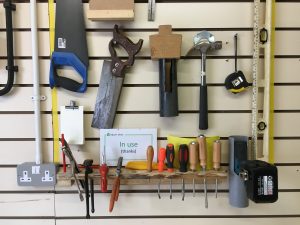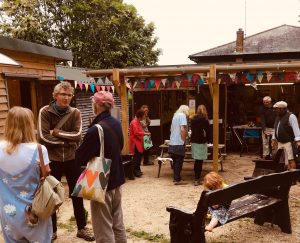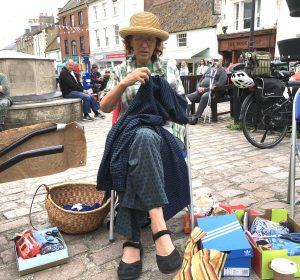August 2021
The Community Shed is a little piece of heaven right here in Bridport. Tucked away on a quiet lane behind East Street, it announces its presence to passersby through the sounds of practical tasks: sawing, hammering and the occasional buzz of a power tool. There’s the homely smell of sheds and sawn wood, and an atmosphere of happy industry.

I visit on a sunny Thursday morning, when the weekly workshop session is in full swing. A break in activity coincides with my arrival as everyone stops what they’re doing to inspect an intriguing pull-along caterpillar toy that Jim has made from wooden disks, a waste product donated by Melplash carpenter Asaf Tolkovsky. There are oohs and aahs of admiration, particularly from Richard, who had suggested the design.
Then a van from Eggardon Sawmill turns up at the yard with a delivery of waste offcuts, bought at a bargain price and destined for all sorts of projects from benches to garden planters. Meanwhile, Sarah is putting the finishing touches to her wooden bat box. It’s all go.
The workshop morning is one of two regular sessions at the Shed. They’re open to absolutely anyone over the age of 18, from complete beginners who want to have a go at making or repairing something to people with decades of experience. Members have been busy recently with mending a bench, making a hexagonal seat for the Allington Hillbillies and knocking up some bird boxes for sale. Many people bring their own projects, use the Shed’s tools and ask for advice from other members – some of whom, like retired carpentry teacher Nigel, have a wealth of knowledge to share. Others have the relevant qualifications to oversee use of the table saw, for instance, and to carry out electrical testing.
The Shed’s other weekly session is craft and upcycling on Mondays. Recent projects include a pinboard made from wine corks; organisers and storage solutions made from discarded tetra paks; a lampshade made from bottletops; and all sorts of fabric creations, including – naturally in these times – facemasks. The craft shed is well stocked with a range of donated textiles and other useful bits and pieces, many of which would otherwise have gone to landfill.
Alongside members’ personal projects, some products are made in response to a request from an individual or group, although this isn’t a simple commission arrangement and the Shed tries to make each project an active experience for everyone concerned. “There are things we could do easily here,” says trustee and active member Raja Jarrah, “but we find that if someone’s involved in the creation of an item, they have a more meaningful sense of ownership and they care for it better. So we make it into a kit that they can put together themselves. New window boxes for the youth centre, for instance, or a guinea pig paddock for a school can become a learning tool for young people working with their teachers.”
Sociable creativity: a win-win
On the surface, all the sessions have a practical goal – making and mending stuff – but, of course, there’s more to the Shed than that. Just as central to its purpose is the idea of bringing people together, of combating loneliness, and this, combined with the hit of the reward chemical, dopamine, that humans get from completing a task, suggests that community sheds could be a sure route to happiness.

This was the idea behind the Royal Voluntary Service (RVS) initiative that helped to launch a national network of community sheds, including Bridport’s. The RVS says these activity sheds are “an opportunity to meet like-minded people with similar interests and talents [and] a great way to share your unique skills and learn some new ones along the way.” People who might shy away from joining a purely social group to make new friends find it easier – and more satisfying – to bond over a shared task.
The Bridport Shed has been running since summer 2018. In its early days, after a brief period at the Othona Community, it used the Christian Science premises for workshop sessions and the upstairs space at Bridport Library for craft sessions (affectionately known as “noisy Wednesdays”). The move to the current yard coincided with the arrival of Covid, and couldn’t have been better timed. Although the Shed had to close during the lockdowns, creating a Covid-safe environment in time for re-opening has been straightforward. “We have plenty of outside space, and there’s cover for working outdoors in wet weather,” says Raja. “The buildings are well ventilated when the doors are open, and we’ve created ‘tool stations’ with all the basic equipment that one person will need while working. They’re left untouched for a few days between sessions, so there’s no risk of cross-contamination.”
The yard belongs to Bridport Town Council – it used to be a groundsmen’s area – and the Shed has negotiated a 10-year lease for a nominal rent. This and other expenses are covered through a charge to members of £3 per session and donations from groups who use the yard as rehearsal space (these include the Cakehole Choir and the Bridport Mummers). There are also donations from the public and businesses: the Original Factory Shop, for instance, has chosen the Shed as its charity of the year. In common with about 100 similar facilities across the country, Bridport’s Shed has become a registered charity.
“We’re also lucky to have a few members who are particularly good at securing grant funding,” says trustee Celia Marsh, who runs the Monday craft sessions with colleague Eileen Haste. “This site is working out really well for us and there’s no other demand on it so we should have it for a long time. We have plans to make the best use of the space here – at the moment, for example, we’re creating a new area of decking behind the main shed for outdoor activities.”
Spreading the message

The Shed has a stall on Bridport Market four times a year to raise its profile locally and sell things members have made. At its most recent appearance, in late June, there was a ‘Stitch it, don’t ditch it’ session inspired by the ‘street stitching’ mending movement (www.facebook.com/twistedtwee) and organised in collaboration with Becca’s Fabric Larder of Beaminster. Members sat in sunny Bucky Doo Square sewing, knitting and crocheting. “We attracted a lot of interest and loads of people came to talk,” says Celia. “Quite a few even brought along their own garments to mend or embellish. It was huge fun.”
I leave Celia, Raja and the other Shed members to their work and walk away with a warm glow that isn’t just from the sunshine. I’m determined to return – hopefully with my dear old dad, who definitely needs to spend more time with like-minded practical chaps. In these post-pandemic, climate emergency times, there’s beauty in sharing practical tasks and restoring loved objects. If the success of TV’s ‘Repair Shop’ is anything to go by, many people are hungry for this kind of comfort and ready to reject the throwaway, just-buy-a-new-one way of life. Community sheds look set to be an important part of that cultural shift.
Bridport Community Shed is between Mountfield and Bedford Place (see map). It’s open on Monday (craft and upcycling) and Thursday (workshop) mornings from 10am, and anyone over 18 is welcome to drop in. You can also visit their website (www.bridportcommunityshed.org.uk) Facebook page or Instagram account (@bridportshed) or email bridportcommunityshed@gmail.com.